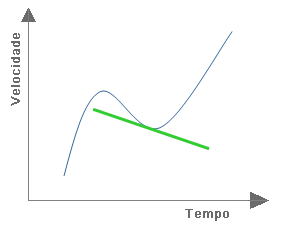Acceleration
|
|
To accelerate an object is to change its velocity over a period of time. In this strict scientific sense, acceleration can have positive and negative values—respectively called acceleration and deceleration (or retardation) in common speech—as well as change of direction. Acceleration is defined technically as "the rate of change of velocity of an object with respect to time" and is given by the equation
- <math>
\mathbf{a} = {d\mathbf{v}\over dt} <math>
where
- a is the acceleration vector
- v is the velocity vector expressed in m/s
- t is time expressed in seconds.
This equation gives a the units of m/(s·s), or m/s² (read as "metres per second per second", or "metres per second squared").
An alternative equation is:
- <math>
\mathbf{\bar{a}} = {\mathbf{v} - \mathbf{u} \over t} <math>
where
- <math>\mathbf{\bar{a}}<math> is the average acceleration (m/s²)
- <math>\mathbf{u}<math> is the initial velocity (m/s)
- <math>\mathbf{v}<math> is the final velocity (m/s)
- <math>\mathbf{t}<math> is the time interval (s)
Transverse acceleration (perpendicular to velocity) causes change in direction. If it is constant in magnitude and changing in direction with the velocity, we get a circular motion. For this centripetal acceleration we have
- <math> \mathbf{a} = - \frac{v^2}{r} \frac{\mathbf{r}}{r} = - \omega^2 \mathbf{r}<math>
One common unit of acceleration is g, one g being the acceleration caused by the gravity of Earth at sea level at 45° latitude (Paris), or about 9.81 m/s².
Accelerating acceleration or jerk is the rate of change of an object's acceleration over time. However, an acceleration of accelerating acceleration would not be distinguished in practice as it would be experienced merely as a different slope of accelerating acceleration.
In classical mechanics, acceleration <math> a \ <math> is related to force <math>F \ <math> and mass <math>m \ <math> (assumed to be constant) by way of Newton's second law:
- <math>
F = m \cdot a <math>
As a result of its invariance under the Galilean transformations, acceleration is an absolute quantity in classical mechanics.
After defining his theory of special relativity, Albert Einstein realized that forces felt by objects undergoing constant acceleration are indistinguishable from those in a gravitational field, and thus defined general relativity (which also resolved how gravity's effects could be limited by the speed of light, but that is another story).
A key point of general relativity is that it solved the "why does only one object feel accelerated?" problem which had plagued philosophers and scientists since Newton's time (and caused Newton to endorse absolute space). Simply put, if you hop in your car and accelerate away from your friend, you could say (given your frame of reference) that it is your friend who is accelerating away from you, although only you feel any force. This is also the basis for the popular Twin paradox, which asks why only one twin ages when moving away from his sibling at near light-speed and then returning, since the aging twin can say that it is the other twin that was moving.
In special relativity, only inertial frames of reference (non-accelerated frames) can be used and are equivalent; general relativity considers all frames, even accelerated ones, to be equivalent. With changing velocity, accelerated objects exist in warped space (as do those that reside in a gravitational field). Therefore, frames of reference must include a description of their local spacetime curvature to qualify as complete.
See also
External links and references
- Online Unit Converter - Conversion of many different units (http://calc.skyrocket.de/en/)
- Zero to 76,000 mph in a Second (http://news.yahoo.com/s/space/zeroto76000mphinasecond;_ylt=Ah_UkpuwMSeZ5i8k1ja4xg0PLBIF;_ylu=X3oDMTBiMW04NW9mBHNlYwMlJVRPUCUl) "Scientists at the Sandia National Labs in Albuquerque, New Mexico have accelerated a small plate from zero to 76,000 mph in less than a second. The speed of the thrust was a new record for Sandia's "Z Machine" - not only the fastest gun in the West, but in the world too."bn:ত্বরণ
ca:Acceleració cs:Zrychlení da:Acceleration de:Beschleunigte Bewegung eo:Akcelo es:Aceleración fi:Kiihtyvyys fr:Accélération ko:가속도 id:Percepatan io:Acelero is:Hröðun it:Accelerazione he:תאוצה hu:Gyorsulás nl:Versnelling ja:加速度 pl:Przyspieszenie pt:Aceleração ru:Ускорение simple:Acceleration sl:Pospešek fi:Kiihtyvyys sv:Acceleration zh-cn:加速度

